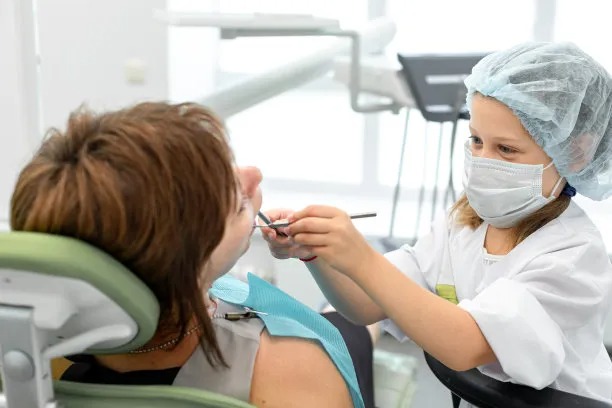Summary: Dental fillings are crucial for restoring teeth damaged by decay or injury, but proper care before and after the procedure is essential to ensure optimal oral health. This article outlines four critical areas of precaution: communicating effectively with your dentist, preparing yourself mentally and physically, understanding post-care procedures, and recognizing potential complications. Each section explores practical steps that can be taken to enhance the effectiveness of dental fillings and maintain a healthy smile. By following these guidelines, patients can improve their experience and promote long-lasting results.
1. Communicate Effectively with Your Dentist

Effective communication with your dentist is paramount for a successful filling procedure. Before your appointment, it’s essential to discuss your dental history, including any allergies or previous reactions to anesthesia. This information helps your dentist tailor the treatment specifically to your needs, thereby minimizing potential risks.
During the consultation, dont hesitate to ask questions about the procedure, the type of materials that will be used, and the expected outcomes. Understanding these aspects can alleviate anxiety and ensure you feel comfortable with the treatment plan.
Additionally, if you are experiencing any discomfort or unusual symptoms leading up to your appointment, inform your dentist immediately. They may need to take further precautions or adjust the treatment strategy to accommodate your situation.
2. Prepare Yourself Mentally and Physically
Preparation is key when it comes to dental fillings. Mentally, its important to practice relaxation techniques to help reduce anxiety before the appointment. Visualization exercises or deep-breathing techniques can minimize stress and promote a sense of calm.
Physically, consider scheduling some time off after your dental appointment. In some cases, the effects of anesthesia can linger, which might impair your ability to drive or perform daily tasks. Allowing time to recover ensures you wont feel rushed and can focus on your treatment.
Moreover, maintain a healthy diet leading up to your appointment. Eating a balanced meal can help stabilize your energy levels, which is crucial as you may not feel like eating immediately post-procedure due to anesthesia or discomfort. Hydration is also essential, so drink plenty of water beforehand.
3. Understand Post-Care Procedures
Post-care after getting dental fillings is equally important to maintain optimal oral health. One of the first things to remember is to avoid eating for at least an hour after the procedure, particularly if local anesthesia was used. Allowing time for the filling to set properly minimizes the risk of dislodging it.
Post-filling, you may experience sensitivity in the treated area. This is normal; however, monitoring the sensitivity and contacting your dentist if it persists longer than a few days is essential. Using desensitizing toothpaste can help alleviate discomfort in the meantime.
Its important to maintain your oral hygiene routine following your appointment. Gentle brushing and flossing is encouraged, but be cautious around the filling to prevent accidental damage. Regular dental check-ups will ensure your fillings remain intact and support your overall oral health.
4. Recognize Potential Complications
Being aware of potential complications can prepare you for any challenges that may arise after getting dental fillings. Some patients might experience prolonged discomfort or a change in bite alignment. If you feel that your bite doesn’t feel right or if something seems off after the filling, reach out to your dentist for evaluation.
Another issue to watch for is signs of infection, such as increased pain, swelling, or fever. These symptoms could indicate complications and require prompt attention from your dentist to prevent further oral health concerns.
Similarly, be cautious of fillings loosening or chipping, especially when eating hard or sticky foods. Practice good oral care, and avoid all harmful habits like grinding your teeth, which can exacerbate these issues. Regular inspections will help catch any problems early on and ensure that your fillings last.
Summary:
Overall, understanding essential precautions before and after getting dental fillings is imperative for maintaining optimal oral health. Effective communication with your dentist, proper mental and physical preparation, adherence to post-care procedures, and vigilance regarding potential complications are all crucial elements of a successful treatment experience.
By following these guidelines, patients can fully benefit from their dental fillings and enjoy a healthier smile. This article is compiled by Vickong Dental and the content is for reference only.
Vickong Dental
Vickong Dental is a large medical group established in Hong Kong in 2008 by professors from well-known medical universities in Guangdong and Hong Kong, as well as medical doctors from key national '985' universities (including Master's supervisors and senior professors). The chain of branches brings together expert dentists with PhDs and Master's degrees from Hong Kong and Mainland China, committed to providing high-quality dental treatment.
"Vickong Dental Practices the University Motto of 'Healing and Serving Society,' with a Stable Operation for Sixteen Years. It Has Been honored with Hong Kong Enterprise Leaders's Choice,' and is a Global Trusted Implant Center for the Nobel Implant System. Recommended by Hong Kong Metro Broadcast and Guangdong Television, it Serves Customers from Over Thirty Countries and Regions, Gaining the Trust and Favor of Citizens from the Guangdong-Hong Kong-Macau Greater Bay Area and Surrounding Cities.

Thousands of customers' unanimous praise
The most recognized and highly recommended dental service by customers in the Guangdong-Hong Kong-Macau Greater Bay Area
We Ensure You Receive Detailed Care and Attention Here
Hong Kong standards, Shenzhen prices, Your Trusted English-speaking dentists

Vickong Dental Medical-Grade Instrument Disinfection Process
Vickong Dental Medical-Grade Instrument Disinfection Process

Vickong Dental Chain: A Warm and Comfortable Environment for Treatment






Appointment Hours

Q&A
Why choose Vickong Dental?
Vickong Dental practices the university motto 「Medicine to Benefit Society」, with each branch bringing together highly qualified dentists with doctoral and master’s degrees from Hong Kong and the Mainland, and has maintained seventeen years of steady operation。Recipient of 「2024 Hong Kong Enterprise Leaders Brand」, 「2025 Hong Kong Enterprise Leaders Brand」, a Nobel Biocare Global Trusted Implant Center, and a brand recommended by Metro Radio Hong Kong and Guangdong TV。
To date, we have served customers from more than thirty countries and regions,earning exceptionally high word-of-mouth recognition and trusted recommendations from residents across the Guangdong-Hong Kong-Macao Greater Bay Area and surrounding cities
We have eight major branches in Zhuhai、Shenzhen,and a consultation and service assurance center in Hong Kong,so you can book a free consultation at any time for any questions,which is very reassuring.
If I do not accept the quotation after the CT scan, will I be charged??
No! As long as the actual treatment has not started, you will not be charged any fees.
Will there be any additional charges during the treatment process?
No, there won’t be any additional charges. Before treatment begins, we will clearly explain the treatment plan and its corresponding fees. Only after the patient agrees and signs the consent form will we proceed with the dental service.
Can I pay in Hong Kong dollars?
Yes. Vickong Dental accepts payment in Hong Kong dollars. The amount will be converted based on the exchange rate of the day, and the applicable rate will be clearly communicated to you in advance.
Can I reschedule my appointment at any time?
Yes. Please contact us via **WeChat** or **WhatsApp** as early as possible, providing your original appointment time and details, along with your preferred new date and time slot for rescheduling.













